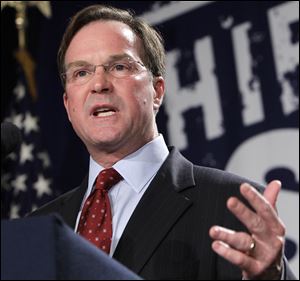
FEATURE EDITORIAL
Juvenile justice
Michigan’s attorney general should not oppose dismantling the state’s barbaric juvenile lifer law
12/3/2013
Schuette
More than a year after the U.S. Supreme Court effectively banned Michigan’s barbaric juvenile lifer law, a federal judge last week ordered the state to set parole hearings for prisoners who are serving sentences under the law.
It’s long past time. Michigan Attorney General Bill Schuette should no longer oppose dismantling this unconstitutional law by appealing the ruling of U.S. District Court Judge John Corbett O’Meara.
For decades, Michigan distinguished itself as one of the few spots on the planet where people who were too young to smoke cigarettes or drive legally could get mandatory sentences of life in prison — the state’s maximum adult penalty.
Enacted in the 1980s, Michigan’s juvenile lifer law applied to offenders as young as 14. Home to 350 of the nation’s 2,200 juvenile lifers, Michigan trails only Massachusetts in the number of such cases.
Granting juvenile lifers parole hearings will not, in itself, release a single offender. Members of the state Parole Board could deny parole if they determine that a person still poses a threat to society.
But many of Michigan’s juvenile lifers ought to be released. Dozens have served decades in prison and long ago turned their lives around.
Many were marginally involved with the homicide they were convicted of. Nearly half were not the killers, but were convicted of aiding and abetting.
Last week’s ruling followed a U.S. Supreme Court decision last year that said automatic no-parole sentences for anyone under the age of 18 constitute cruel and unusual punishment, as defined by the Eighth Amendment to the U.S. Constitution. But Mr. Schuette has argued against considering parole for juvenile lifers. Most recently, he said the ruling should not apply to past cases, except for those who initiated the court action.
Judge O’Meara properly ruled that the decision applies to all inmates convicted in such cases. They will now have an opportunity to apply for release if they have served at least 10 years.
“It’s beautiful,” prisoner Henry Hill, Jr., a lead defendant in the suit challenging the state law, told The Blade’s editorial page in a call from Thumb Correctional Facility in Michigan. “This not only applies to us, but to generations to come.”
In Mr. Hill’s case, witnesses — including an off-duty police officer — testified that Mr. Hill was running from the scene when the victim was shot. Now 50, Mr. Hill has already spent more than three decades in prison for a crime he committed when he was 16.
The United States was the only country that sentenced juveniles to life in prison without possibility of parole. Judge O’Meara said Michigan failed to take action in the wake of the U.S. Supreme Court ruling that invalidated the state’s sentencing scheme. He threatened to appoint a special master to execute the order if the state fails to comply.
In the next two months, the state must create an administrative structure to determine which juvenile lifers deserve parole, notify juvenile lifers who have been locked up for at least 10 years that they will be considered for parole, schedule public hearings for eligible prisoners, and ensure that the Parole Board explain its decisions in each case. He also ordered that all juvenile lifers have access to educational and training programs that are available to the general prison population.
Michigan’s juvenile lifer law is irrational and unjust. Juveniles don’t have the same legal rights and duties as adults because they lack the maturity and judgment to handle them. They should not suffer the same consequences.
Mr. Schuette would do well to let this shameful — and unconstitutional — piece of Michigan’s history end now.